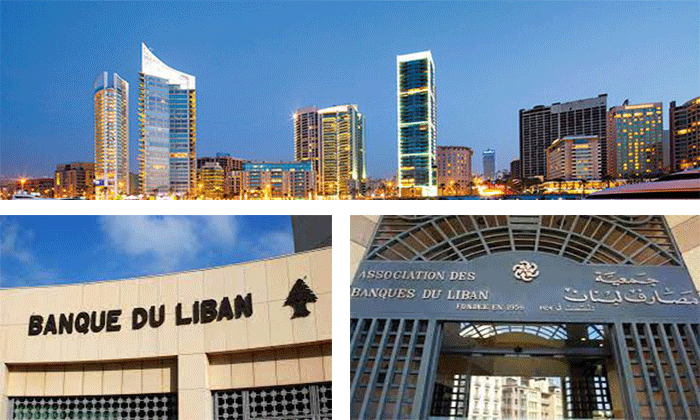This article is an excerpt from a study entitled “Reshaping the Lebanese Banking Sector: Key Insights & Restructuring Plan” and prepared by the USEK Business School
After being called “Switzerland of the Middle East”, Lebanon is sinking, according to the World Bank Lebanon Economic Monitor. With the unfolding of the current economic crisis and the decrease in the inflow of remittances from the Lebanese diaspora, coupled with little financial aid from Gulf countries and the West, Lebanon’s currency peg, which was described for more than twenty years as an anchor of financial and social stability, has become a burden for the country. In fact, the Lebanese pound has lost more than 100% of its worth since late 2019, when Lebanon’s economic and financial crisis erupted.
Today, the lack of confidence in the banking sector, due to its inability to give depositors their money back after the State became practically insolvent and defaulted on its internal and external debt, the lack of foreign currency inflow, the rapid devaluation of the Lebanese pound against the US dollar, the lack of solutions or actions, the fiscal deficit, the soaring inflation, economic contraction, unemployment, the political standstill and several other factors have all contributed to the crash of the Lebanese banking sector.
One of the most essential reforms that must take place to put Lebanon’s economy back on the right track is restructuring the ailing banking sector, which will be paramount to ensuring long-term growth and to building a productive economic model. The ultimate purpose of such a process will be to fully recapitalize banks, restore their solvency and regain public trust. Banks must rush to implement a considerable restructuring agenda ensuring a reasonable distribution of losses among economic agents, build new business models, and take advantage of the upcoming period to find a way out of the turmoil.
In light of this brief overview, we outline a new business structure that could restore confidence in the banking sector and increase its profitability in the upcoming period. However, rather than placing this liquidity at BDL in the form of reserves, where it is likely to be slowly depleted on subsidies, it would be far more beneficial for the economy if it were injected in the form of investments. It is high time for Lebanon to gradually lift subsidies on government services and essential products and strengthen its national currency and the purchasing power of its citizens through a thriving economy.
This will require a complete revamping of the banking sector and a redesigning of bank investment strategies and their relationship with BDL and the government, addressing three main areas in the banking sector: cost reduction, liabilities management, and income generation.
For cost reduction, the banks should be downsized either by merging with other banks or by leaving the market. The number of branches in Lebanon is higher than the regional and international benchmarks and should be reduced by 50% to minimize unwanted expenses. Moreover, the banking sector should also reduce staff and benefits while preserving and seeking talented employees as a powerful way to cut down on staffing costs. Finally, shifting to E-banking (such as smart services and branches) could lead to optimal implementation of cost management strategies.
As for liabilities management, the Central Bank should announce a significant haircut on banks by 60-70% in order to meet the existing liabilities as numbers become more reasonable, then we shall be able to lessen or eliminate the gap between the Central Bank’s liabilities and the remaining foreign currency reserves. This measure, despite its difficult social repercussions, will facilitate negotiations with the International Monetary Fund, because reducing losses accelerates the possibility of a rapid economic recovery. In addition, sustainable banks must compensate depositors using the returns earned through their new investment and financial activities, and the government must reimburse these obligations from its investments in a pool of assets such as electricity, oil and gas if available, real estate, etc. In this context, the study presents a clear and accurate program in numbers that enables banks to protect small deposits and the possibility of repaying them in phases, and encourages them to pursue investment in the banking sector for the primary role it can play during the post-crisis period.
For the income generation, the banking sector must generate a new source of income to compensate old depositors and thrive again. The imposed raise in capital and the remaining amount of foreign currency reserves must be invested and deployed to reshape the banking sector to meet international standards and not cover losses. From this point of view, the study presents many ideas for these contemporary banking activities with their expected return on investment, in addition to their primary role in moving the economic wheel and getting rid of unproductive traditional techniques.
As diversification is essential, having a corporate and investment banking division is crucial for ending the turmoil since it helps alter the risk and generate additional income to compensate old depositors. One of the alternatives to compel the banking sector to improve its business models and adopt new digital developments is to invest in FinTech (tech companies that present financial products and services). Shifting towards algorithmic trading and artificial intelligence has proved to generate higher income than manual trading along with lowering the number of personnel and the overall cost.
In conclusion, any business model for any new division or area to be implemented must include a full business plan and a feasibility study. The banking system needs time and will encounter and settle many losses at first. Only a reform-minded government, which embarks upon a credible plan toward financial and economic recovery, while collaborating with all stakeholders, can save Lebanon from sinking further.
















